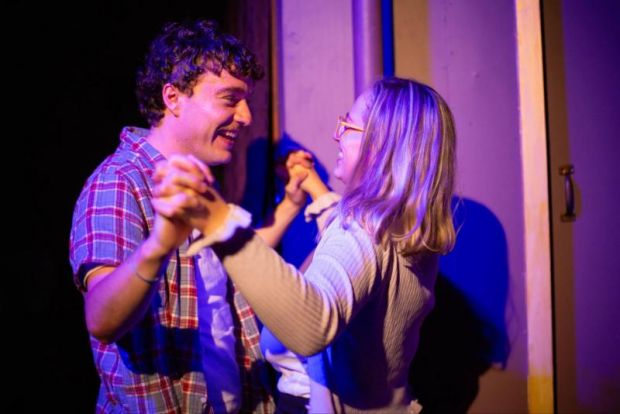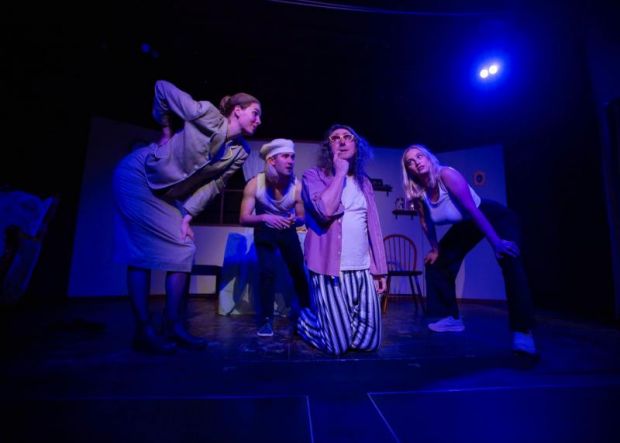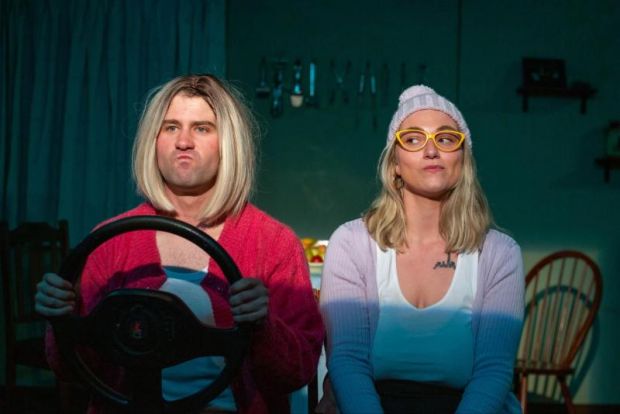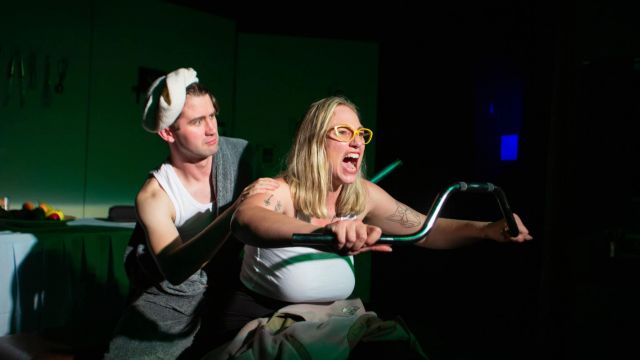Sunday Roast
Families can be awful. Around the dinner table, we are often at our worst, reverting to childhood roles, throwing up long held resentments and uncovering family secrets. Sunday Roast by Thomas Sainsbury is a black comedy exposing a grotesque family at their worst. In a parody worthy of Aristophanes, the worst excesses of the privileged and corrupt are exposed.
Like Ancient Greek comedy where only three actors took all roles, in Sunday Roast, five actors use hats, wigs and props, in exaggerated portrayals of eight (plus) characters. Interestingly, Sainsbury wrote his play for two actors. Even with five performers, the pace is frenetic (the ‘Tell us, Tamsin” scene). Back stage logistics and property management testify to tight direction.
Most scenes involve just two characters. Each grouping has an auditory theme. Finn Carter’s compositions are a unifying element. Rupert’s theme notably picks up pace towards the end.

It also helps to know that each character is based on one of the seven deadly sins. Paul McNally plays patriarch, Phillip, who provides the inciting incident when he declares that he is preparing his will. Phillip (Gluttony) is morbidly obese and seriously ailing. McNally physically characterises this without recourse (thankfully) to a fat suit and his versatility is shown in other small roles. The role of Phillip incarnates the indiscriminate consumption of the wealthy.
Rosemary Cann is matriarch, Leanne. Embodying Greed, Leanne is motivated to expand the family farm for her family. Her blood red talons leave marks on everyone. Cann is a commanding presence, with excellent comic timing. The menu recital between Cann and McNally is memorable as is the tissue scene. Presumably some of this is indicated in the script but some at the behest of directors and actor input.
Benedicta McGeown is startlingly different in the roles of Courtney (Wrath) and Tamsin (Lust). Courtney is a crass, angry aggressive woman, a chef adept with a carving knife. Tamsin, in a beanie and glasses, comes across as young, sweet, worldly-wise but naïve at the same time. It is easy to forget that McGeown is playing both characters.

The same can be said of Inigo Wadsley. As embittered sister Diane (Envy) he sports a “Karen” wig and pulls on a cigarette. Pink cardigan wrapped across his chest, Wadsley embodies the stereotypical middle-aged woman whose life has offered nothing more than disappointment. Wadsley is also believable as Anthony (Sloth) the lazy heir apparent, and, as the over-the-top ridiculous boyfriend, Francois (Vanity). Francois primps and preens as Wadsley parodies the accent. At the climax of the play, Wadsley transitions rapidly between each character. The physical comedy is heightened when he is depicting interaction between two of his roles (e.g. the nose incident) and when he disports an upside-down wig with a French beret.
Tommy Howard plays Rupert, the new foster child. Howard tugs at the heart strings with a realistic performance. He is convincing as a 14-year-old, with awkward long limbs and expressive face. Howard turns on the tears. Rupert is often described as poor in contrast to his adoptive family who are morally bankrupt and deficient in real feeling.
The costumes are great, from the firemen’s outfits, right down to Rupert’s odd socks. The lighting is a well utilised feature. Scenes in vehicles are clearly defined, and darker changes in mood signalled by ominous red with a low rumble in the speakers. Lighting cues are spot on with action and sound design. These elements combined to great effect during the final car chase. Tableau is another feature which contributes effectively to the whole. The directors have added these and other elements not achievable with the original two-handed casting.

Sunday Roast is very funny, in a dark way. The program notes describe the play as “a hideous reflection, a caricature of the ugly parts of society”. It is a train wreck from which the audience cannot look away. It is ‘Cards against humanity’. We laugh and are simultaneously appalled but we affirm what we know to be intolerable.
Review by Anne Blythe-Cooper
Photographer: Jacob Golding
Subscribe to our E-Newsletter, buy our latest print edition or find a Performing Arts book at Book Nook.

